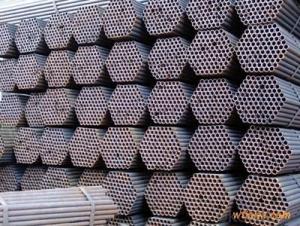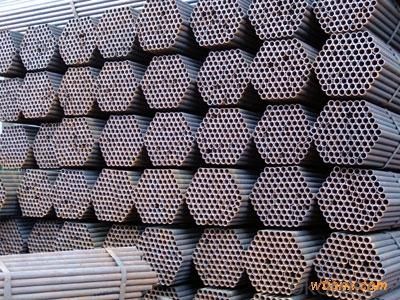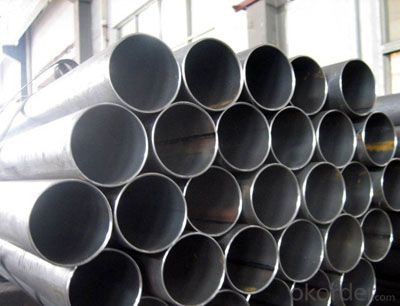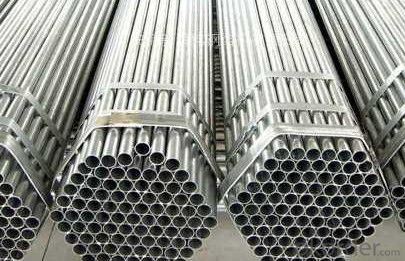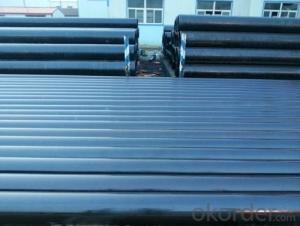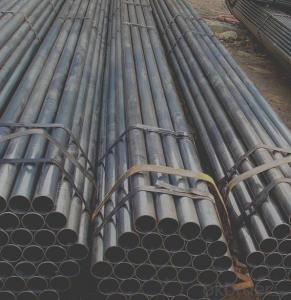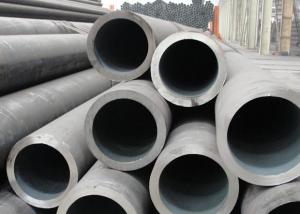Steel Pipe GB9711.2 for Conveying Gas Oil Petrolum
- Loading Port:
- Tianjin
- Payment Terms:
- TT OR LC
- Min Order Qty:
- 25 m.t.
- Supply Capability:
- 9000 m.t./month
OKorder Service Pledge
OKorder Financial Service
You Might Also Like
1、Welded Gas steel Pipe GB9711.2:
GB9711.2 Gas steel pipe is electric resistance welding, the abbreviation for Oil for transporting oil and natural gas vapor liquid objects, can meet the requirements of high and low pressure, the transport in the world with pipe sector accounted for a pivotal position.
2、Main Features of Welded Black Gas steel Pipe GB9711.2:
• High manufacturing accuracy
• High strength
• Good visual effect
• Reasonable price
• Small inertia resistance
• Strong heat dissipation ability
3、Welded Black Gas steel Pipe Specification GB9711.2:
Standard | GB, DIN, ASTM ASTM A106-2006, ASTM A53-2007 |
Grade | 10#-45#, 16Mn 10#, 20#, 45#, 16Mn |
Thickness | 1 - 33 mm |
Section Shape | Round |
Outer Diameter | 21 - 610mm |
Place of Origin | Tianjin, China (Mainland) |
Secondary Or Not | Non-secondary |
Application | Hydraulic Pipe |
Technique | Cold Drawn |
Certification | API |
Surface Treatment | factory state or painted black |
Special Pipe | API Pipe |
Alloy Or Not | Non-alloy |
Length | 5-12M |
Outer Diameter | 21.3-610mm |
Grade | 20#, 45#, Q345, API J55, API K55, API L80, API N80, API P110, A53B |
Standard | ASME, ASTM |
1) Material:20#(ASTM A 106/A53 GRB.API5LGRB,GB),45#,16Mn,10#.
2) Specification range:OD:21.3-610mm,WT:6-70mm,length:6-12m or according to the requirement of clients.
3) Excutive standards:GB,ASME API5L.ASTM A 106/A53,Despite of the above standards,we can also supply seamless steel pipe with standard of DIN,JIS,and so on,and also develop new products according to the requirements of our clients!
4) Surface:black lacquered,varnish coating or galvanized.
5) Ends:Beveled or square cut,plastic capped,painted.
6) Packing:bundles wrapped with strong steel strip,seaworthy packing.
4、Packaging & Delivery
Packaging Details: | seaworthy package,bundles wrapped with strong steel strip |
Delivery Detail: | 15-30days after received 30%TT |
5、FAQ of Welded Black Gas steel Pipe GB9711.2:
①How is the quality of your products?
Our products are manufactured strictly according to national and internaional standard, and we take a test
on every pipe before delivered out. If you want see our quality certifications and all kinds of testing report, please just ask us for it.
Guaranteed: If products’ quality don’t accord to discription as we give or the promise before you place order, we promise 100% refund.
②How about price?
Yes, we are factory and be able to give you lowest price below market one, and we have a policy that “ for saving time and absolutely honest business attitude, we quote as lowest as possible for any customer, and discount can be given according to quantity”,if you like bargain and factory price is not low enough as you think, just don’t waste your time.Please trust the quotation we would give you, it is professional one.
③Why should you chose us?
Chose happens because of quality, then price, We can give you both.Additionally, we can also offer professional products inquiry, products knowledge train(for agents), smooth goods delivery, exellent customer solution proposals.Our service formula: good quality+good price+good service=customer’s trust
SGS test is available, customer inspection before shipping is welcome, third party inspection is no problem.
6、 Welded Black Gas steel Pipe Images GB9711.2:
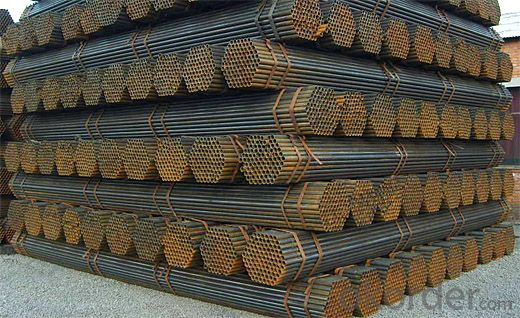
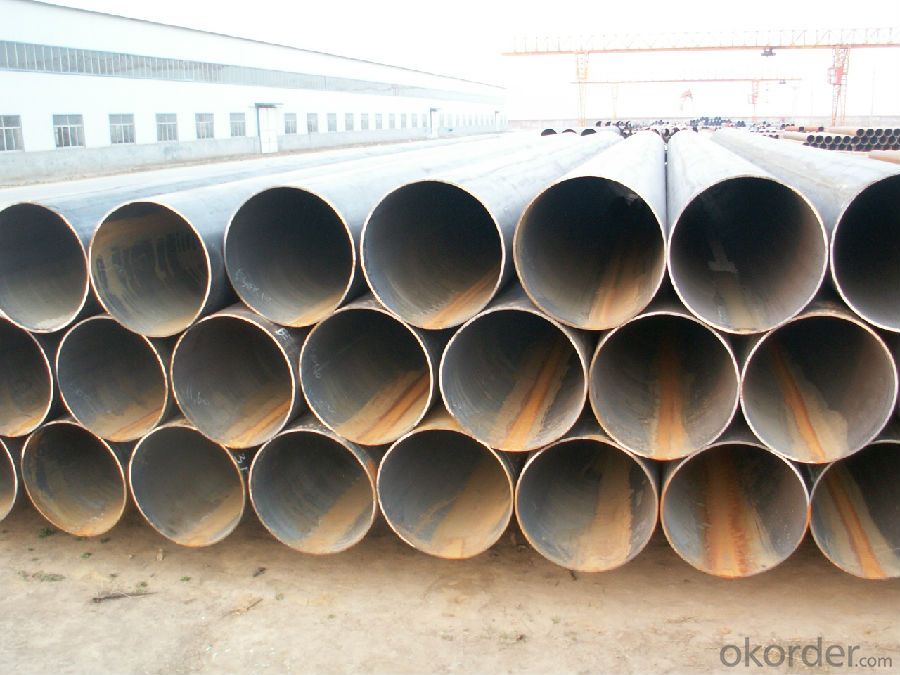
- Q: What is the average cost of steel pipes?
- Several factors, including size, grade, and quantity of steel pipes needed, as well as current market conditions, can cause the average cost of steel pipes to vary. Typically, steel pipes range in cost from $500 to $1500 per ton. Nonetheless, it should be emphasized that this is only a rough estimation, and prices may fluctuate due to factors such as demand, location, and quality. For more precise pricing information based on specific project requirements, it is advisable to contact suppliers or manufacturers.
- Q: Can steel pipes be used for the construction of offshore platforms?
- Yes, steel pipes can be used for the construction of offshore platforms. Steel pipes are commonly used in offshore platform construction due to their high strength, durability, and resistance to corrosion. These pipes can be used for various purposes such as structural support, transporting fluids, and as conduits for electrical and communication systems. Additionally, steel pipes can be easily fabricated, installed, and maintained, making them a reliable choice for offshore platform construction.
- Q: How are steel pipes graded?
- The quality and suitability of steel pipes are determined by grading them based on several factors. The grading system typically takes into account parameters such as the chemical composition, mechanical properties, manufacturing method, and testing standards. 1. When it comes to the chemical composition, steel pipes are graded according to the elements present in their composition. This includes the quantities of carbon, manganese, phosphorus, sulfur, and other alloying elements. The pipe's strength, corrosion resistance, and other properties are greatly influenced by its chemical composition. 2. The mechanical properties of steel pipes play a crucial role in determining their strength, flexibility, and resistance to pressure and temperature. These properties encompass tensile strength, yield strength, elongation, hardness, and impact toughness. Pipes with higher mechanical properties are generally given higher grades. 3. The manufacturing method used for steel pipes can vary, with options such as seamless, welded, or ERW (Electric Resistance Welding). The manufacturing method has an impact on the pipe's integrity, dimensional accuracy, and overall quality. For example, seamless pipes are considered to be of higher quality due to their uniformity and lack of weld seams. 4. Steel pipes are graded based on their adherence to specific testing standards. These standards ensure that the pipes meet the required quality criteria and are suitable for their intended applications. Common testing standards include ASTM (American Society for Testing and Materials), API (American Petroleum Institute), and EN (European Norms). Taking these factors into consideration, steel pipes are often assigned alphanumeric codes or specifications for grading. For instance, pipes used in the oil and gas industry may be graded as API 5L (American Petroleum Institute), while pipes used for structural purposes may be graded as ASTM A500 (American Society for Testing and Materials). In conclusion, the grading of steel pipes is determined by their chemical composition, mechanical properties, manufacturing method, and adherence to testing standards. These grades assist customers and manufacturers in selecting the appropriate pipes for specific applications, ensuring safety, durability, and efficiency across various industries.
- Q: What is the difference between internal and external coating of steel pipes?
- The difference between internal and external coating of steel pipes lies in their purpose and application. Internal coating is applied to the inner surface of the pipe to protect it from corrosion, enhance flow efficiency, and prevent contamination of transported fluids. It is commonly used in industries such as oil and gas, water treatment, and chemical processing. On the other hand, external coating is applied to the outer surface of the pipe to protect it from corrosion caused by environmental factors such as moisture, chemicals, and physical damage. It is typically used in underground or above-ground applications, including pipelines, structural steel, and water distribution systems.
- Q: Can steel pipes be used for mining applications?
- Indeed, mining applications do permit the utilization of steel pipes. The mining industry frequently employs steel pipes for diverse objectives. Specifically, they are commonly utilized for the conveyance of fluids, such as water or slurry, during mining operations. Steel pipes possess remarkable attributes, including durability, strength, and resistance to corrosion, rendering them suitable for the demanding and corrosive underground mining environments. They have the ability to endure high pressure and effectively manage the substantial loads associated with mining applications. Furthermore, the ease with which steel pipes can be welded and connected facilitates efficient installation and maintenance. Considering all factors, steel pipes prove to be a reliable and economically sound option for mining applications.
- Q: Can steel pipes be bent?
- Steel pipes can indeed be bent. To achieve this, one usually employs specific tools and methods like pipe bending machines or hydraulic presses. These tools exert pressure on the pipe, leading it to change shape and adopt the desired angle or form. The flexibility of steel pipes makes them adaptable and appropriate for an array of purposes, such as plumbing, construction, and manufacturing. Nonetheless, it's crucial to acknowledge that the extent to which a steel pipe can be bent relies on factors like its diameter, wall thickness, and the type of steel employed.
- Q: How do you calculate the pressure drop in a steel pipe?
- When determining the pressure decrease in a steel pipe, various factors need to be taken into account. These factors include the pipe's diameter and length, the fluid's flow rate, and the fluid's properties. One commonly utilized equation for calculating the pressure drop in a pipe is the Darcy-Weisbach equation. This equation is as follows: ΔP = (f * (L / D) * (ρ * V^2)) / (2 * D) In this equation: - ΔP represents the pressure drop in the pipe - f denotes the Darcy friction factor, which relies on the pipe's roughness and Reynolds number - L refers to the pipe's length - D represents the pipe's diameter - ρ signifies the fluid's density - V indicates the fluid's velocity To compute the Darcy friction factor, different methods can be employed depending on the flow regime. For laminar flow, the formula f = 16 / Re can be utilized, where Re represents the Reynolds number. For turbulent flow, the friction factor can be determined using various methods, such as the Colebrook equation or the Moody chart. It should be noted that the fluid's properties, such as viscosity and density, may vary with temperature and pressure. Thus, considering these variations is crucial when calculating the pressure drop. Moreover, it is important to acknowledge that additional factors, including fittings, valves, and elbows, can impact the pressure drop in a steel pipe. These factors introduce extra losses, which can be accounted for by employing appropriate correction factors or directly measuring the pressure drop across these components. Overall, calculating the pressure drop in a steel pipe necessitates the use of suitable equations, taking into account the fluid's properties, and considering the various factors that can influence the flow. It is advisable to consult relevant engineering handbooks or employ specialized software for accurate calculations.
- Q: What are low-pressure carbon steel tubes?
- It's pressure levelThe design pressure (P) of pressure vessel is divided into four pressure levels: low voltage, medium pressure, high pressure and extra high pressure:(1) low voltage: Code L, 0.1MPa is less than or equal to p<1.6MPa(2) MP: Code M, 1.6MPa is less than or equal to p<10.0MPa(3) high voltage: Code H, 10.0MPa is less than or equal to p<100.0MPa(4) high voltage: Code U, P = 100.0MPa
- Q: How are steel pipes transported from the manufacturing site to the construction site?
- Steel pipes are typically transported from the manufacturing site to the construction site using various methods, including trucks, trains, and ships. These transportation modes ensure efficient and cost-effective delivery, depending on the distance and infrastructure available.
- Q: How are steel pipes used in the manufacturing of agricultural machinery and equipment?
- Due to their various advantageous properties, steel pipes have become widely utilized in the production of agricultural machinery and equipment. These pipes are employed in multiple ways to improve the efficiency and durability of such machinery. A primary application of steel pipes in agricultural machinery is their use in constructing frames and chassis. The exceptional strength and structural integrity of steel pipes make them an ideal choice for supporting heavy loads and enduring the demanding conditions often encountered in agricultural operations. Whether it is a tractor, combine harvester, or tillage equipment, steel pipe frames provide the necessary stability and sturdiness required for these machines to function efficiently in the field. Another common use of steel pipes in agricultural machinery is within hydraulic systems. These pipes function as conduits for hydraulic fluids, ensuring the smooth and reliable operation of various components, such as hydraulic cylinders, pumps, and motors. Thanks to their corrosion resistance and ability to withstand high pressure, steel pipes contribute to the longevity of hydraulic systems, reducing maintenance and repair costs for agricultural machinery. Moreover, steel pipes find application in the exhaust systems of agricultural equipment. To minimize environmental impact and maintain engine performance, it is essential to safely and efficiently expel the exhaust gases produced by engines. Steel pipes with suitable thickness and thermal resistance are employed in constructing exhaust systems, enabling the effective removal of exhaust gases while reducing noise pollution. Additionally, steel pipes are utilized in the manufacturing of irrigation systems and equipment used in agriculture. Whether it involves transporting water from a source to the fields or distributing water to crops through sprinklers or drip irrigation, steel pipes provide the necessary durability and pressure resistance for efficient water delivery while minimizing leaks. In conclusion, the incorporation of steel pipes in the manufacturing of agricultural machinery and equipment plays a vital role in enhancing their performance, durability, and efficiency. The exceptional strength, structural integrity, corrosion resistance, and high pressure capabilities of steel pipes make them indispensable components in various applications within the agricultural sector.
Send your message to us
Steel Pipe GB9711.2 for Conveying Gas Oil Petrolum
- Loading Port:
- Tianjin
- Payment Terms:
- TT OR LC
- Min Order Qty:
- 25 m.t.
- Supply Capability:
- 9000 m.t./month
OKorder Service Pledge
OKorder Financial Service
Similar products
Hot products
Hot Searches
Related keywords
